Nursing Home Nurse Resume Examples

Mar 25, 2025
|
12 min read
Craft a standout nursing home nurse resume that captures your unique skills and compassion. Learn tips and tricks to showcase your care-giving excellence and make your application truly un-forget-a-bed for potential employers.
Rated by 348 people
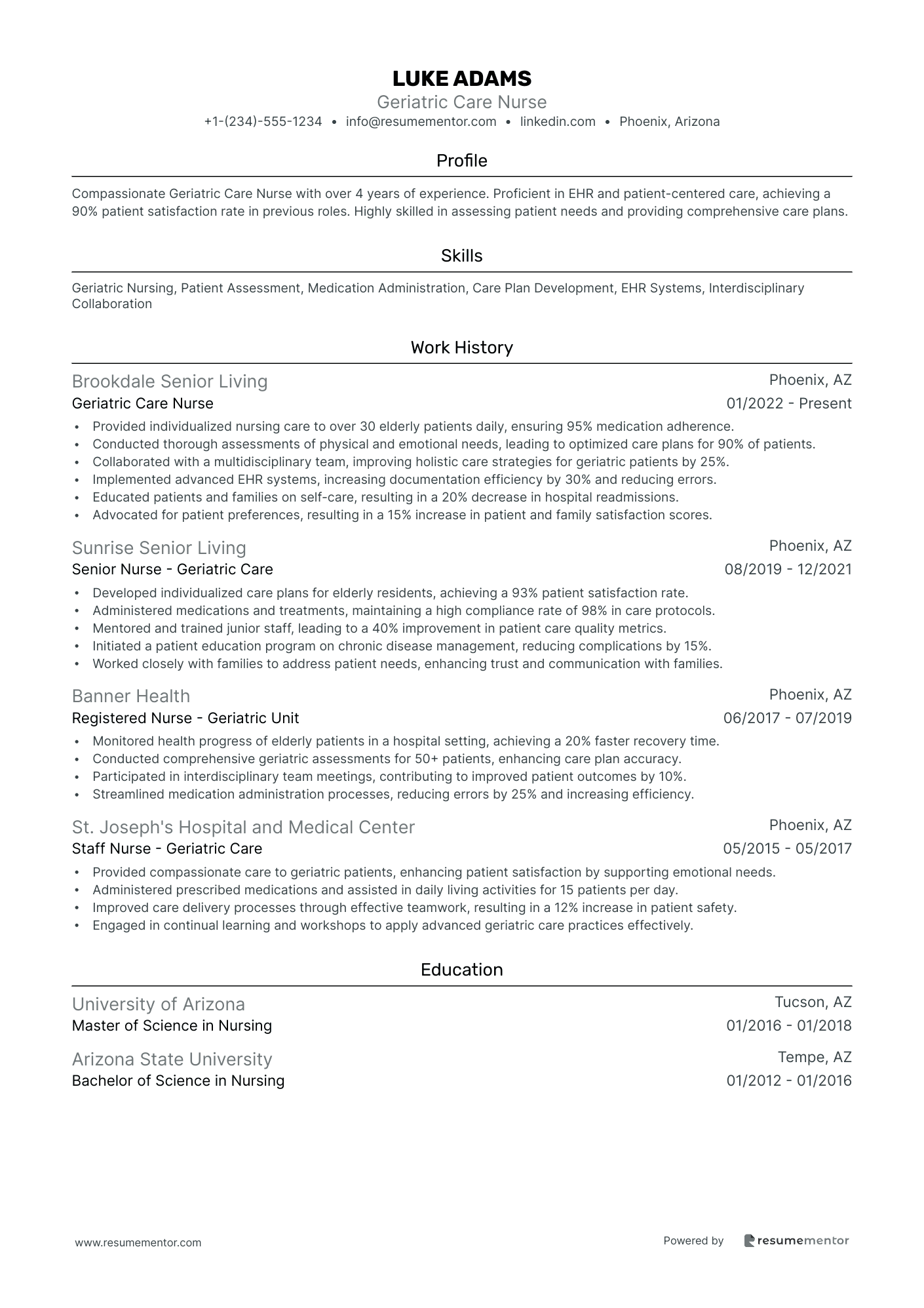
Geriatric Care Nurse
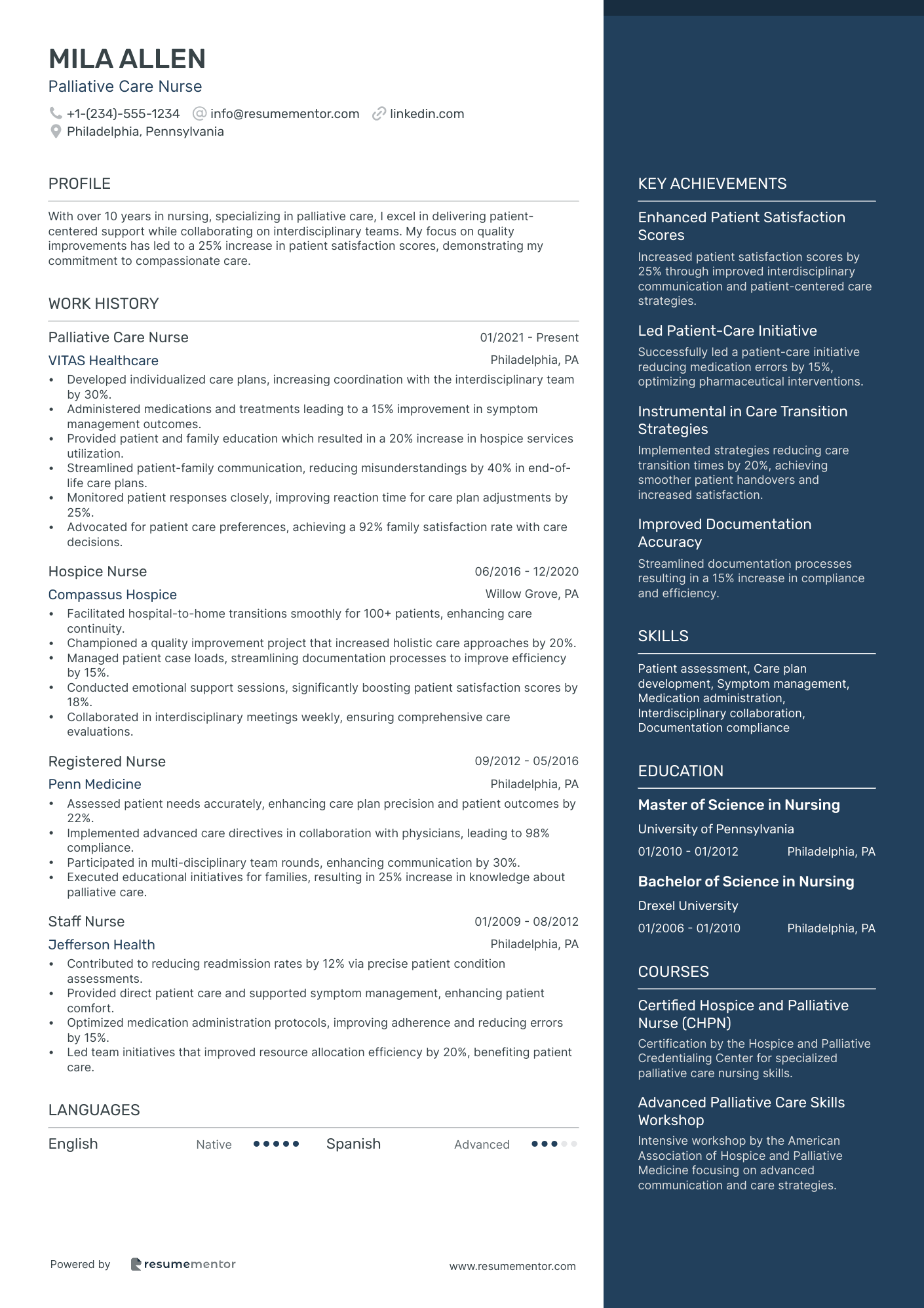
Palliative Care Nurse
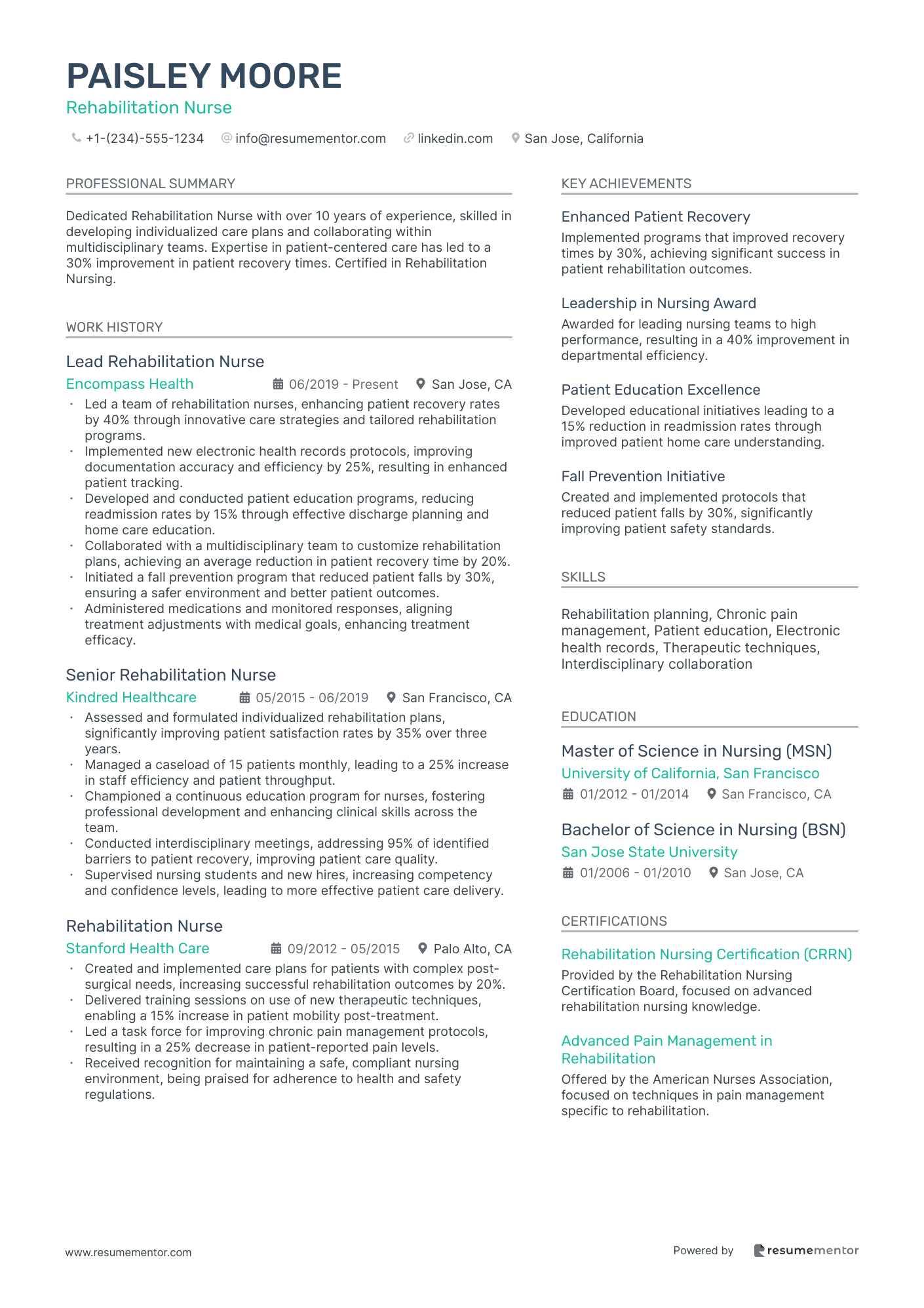
Rehabilitation Nurse
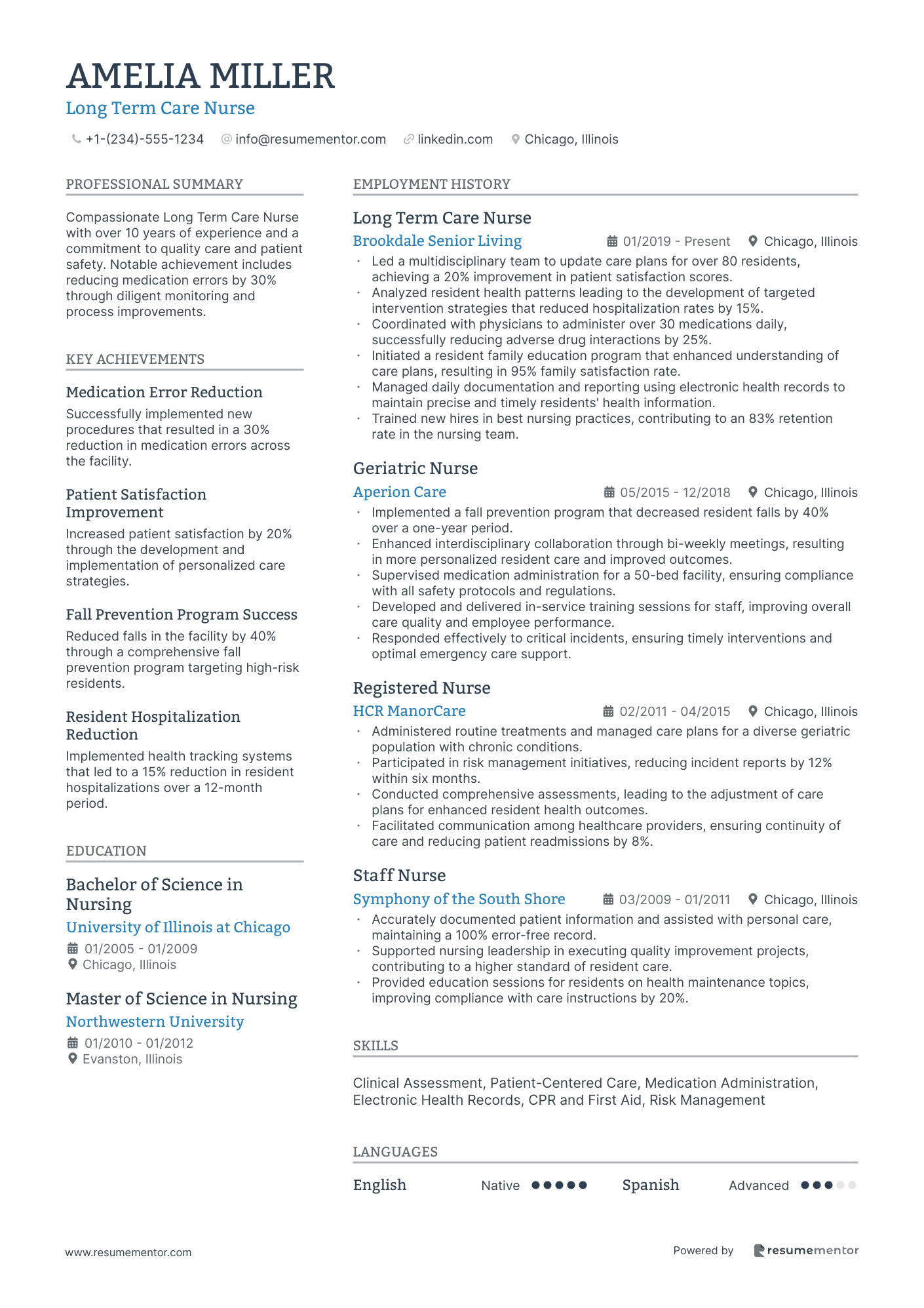
Long Term Care Nurse
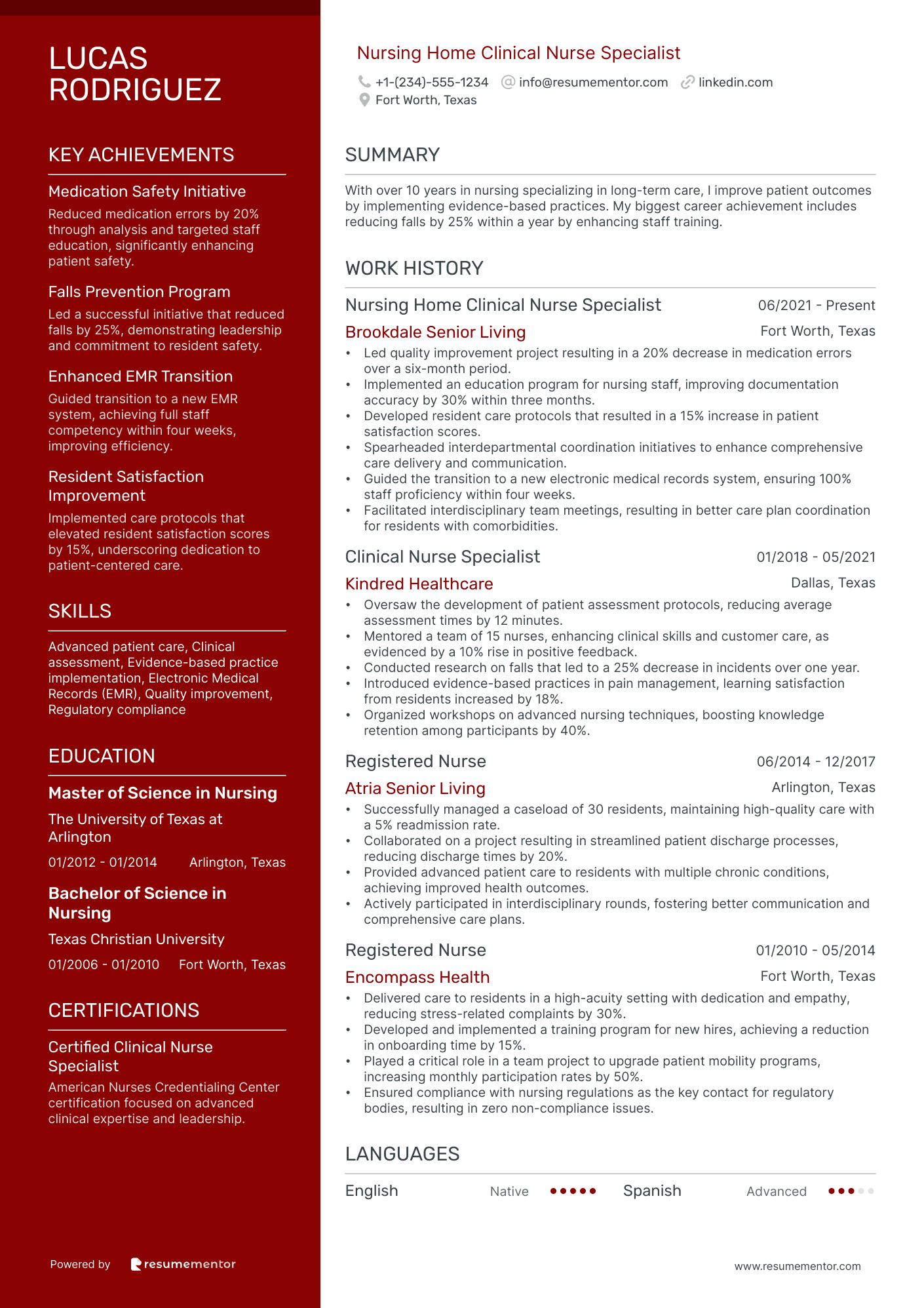
Nursing Home Clinical Nurse Specialist
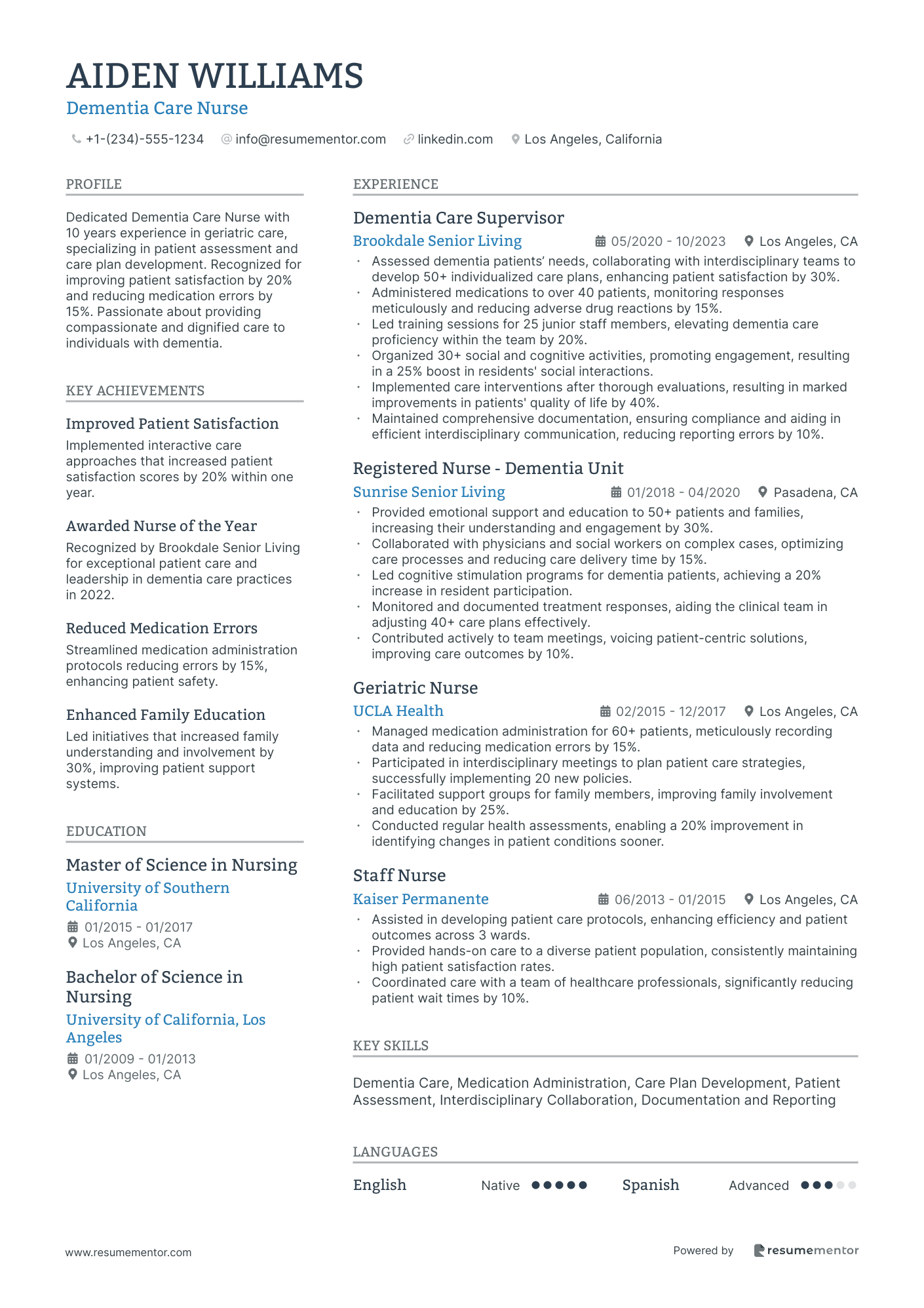
Dementia Care Nurse
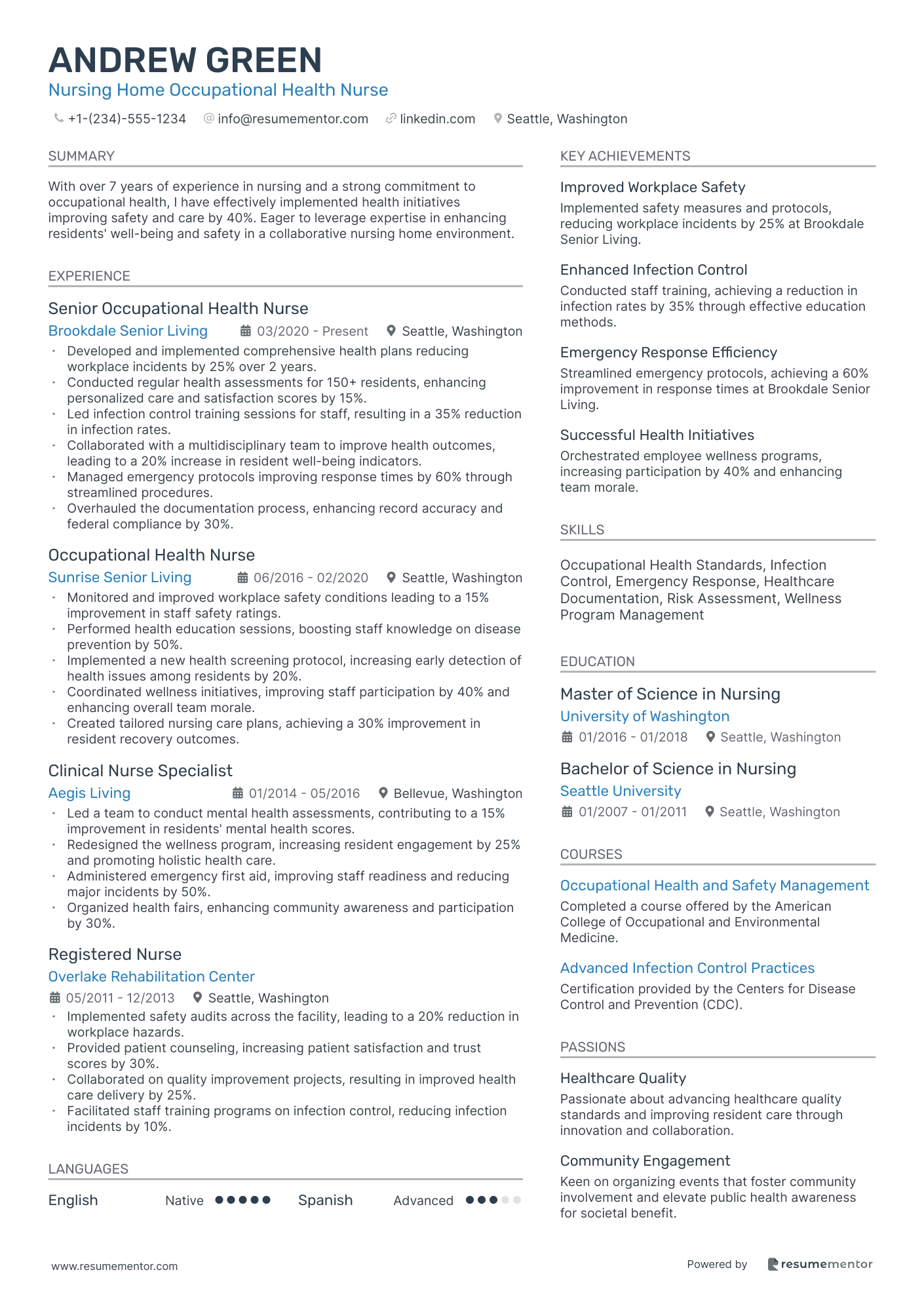
Nursing Home Occupational Health Nurse
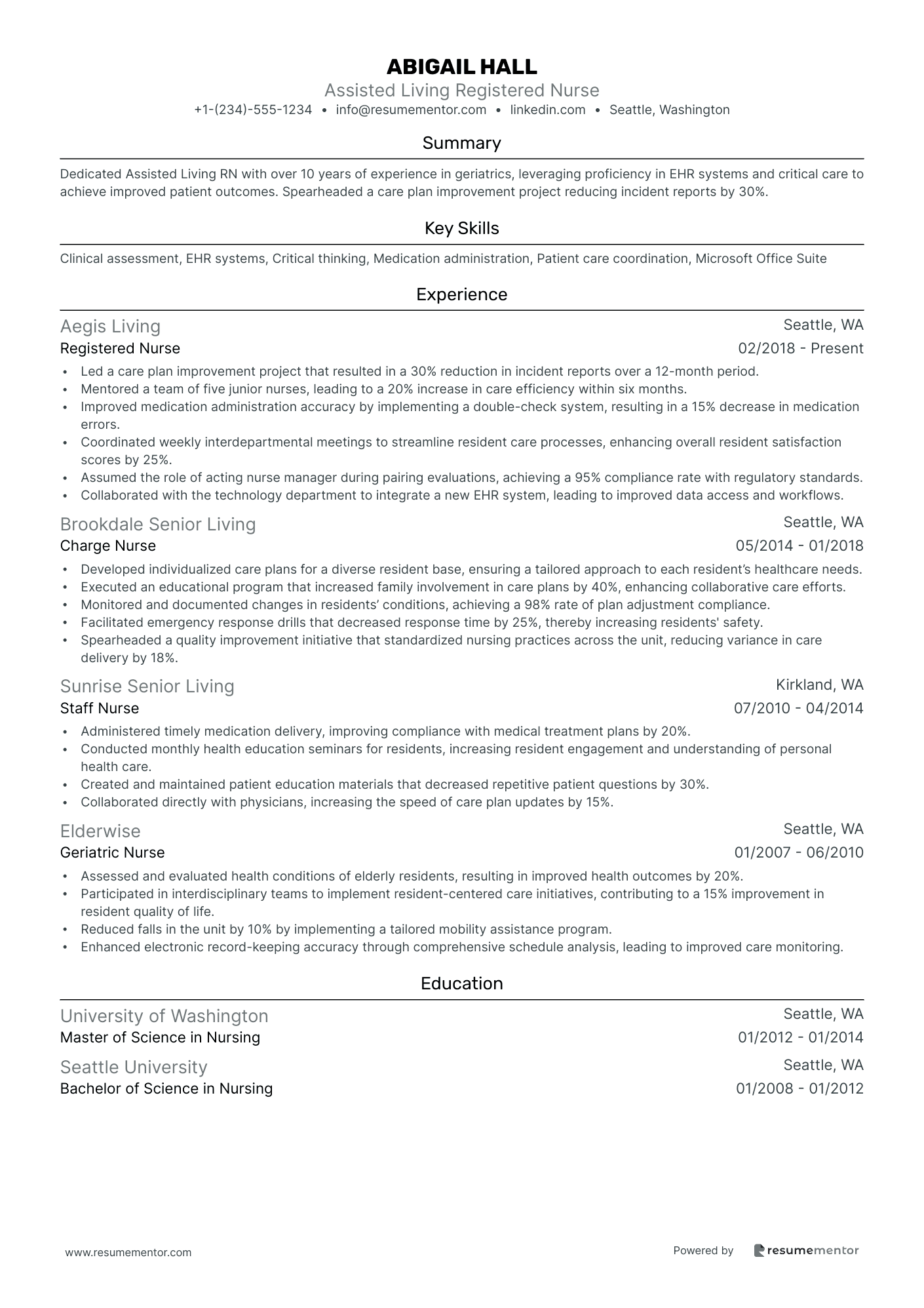
Assisted Living Registered Nurse
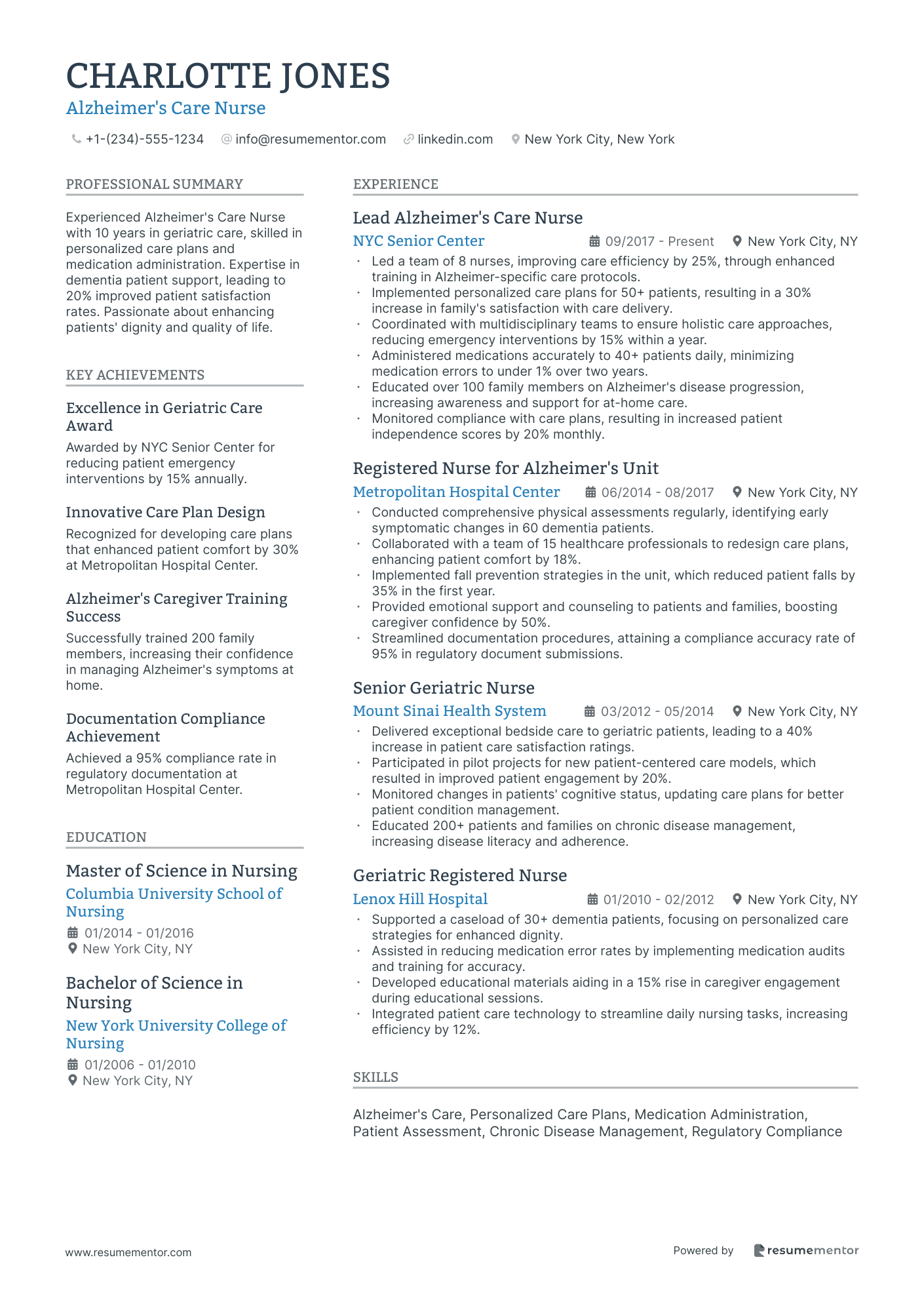
Alzheimer's Care Nurse
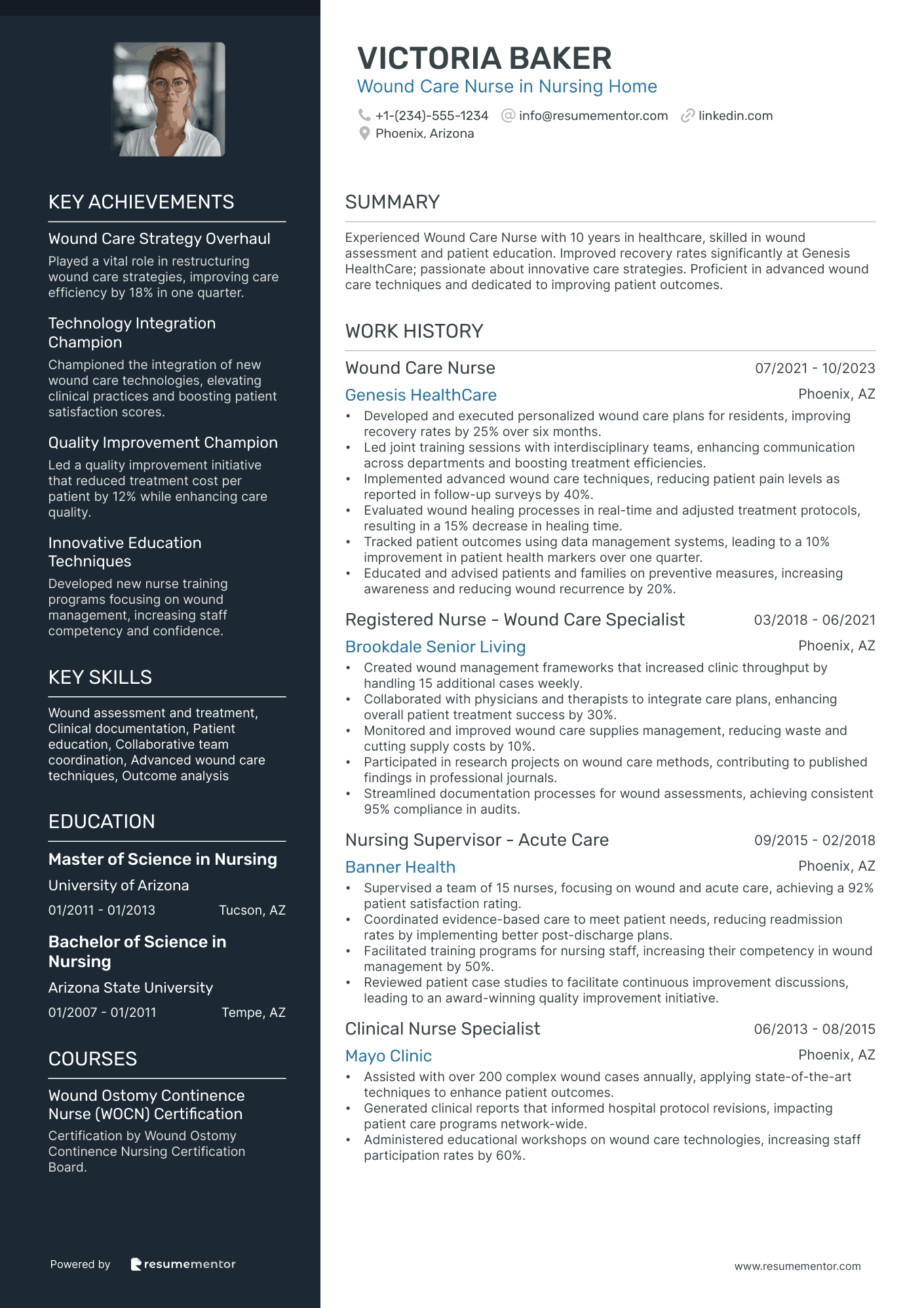
Wound Care Nurse in Nursing Home

Geriatric Care Nurse resume sample
- •Provided individualized nursing care to over 30 elderly patients daily, ensuring 95% medication adherence.
- •Conducted thorough assessments of physical and emotional needs, leading to optimized care plans for 90% of patients.
- •Collaborated with a multidisciplinary team, improving holistic care strategies for geriatric patients by 25%.
- •Implemented advanced EHR systems, increasing documentation efficiency by 30% and reducing errors.
- •Educated patients and families on self-care, resulting in a 20% decrease in hospital readmissions.
- •Advocated for patient preferences, resulting in a 15% increase in patient and family satisfaction scores.
- •Developed individualized care plans for elderly residents, achieving a 93% patient satisfaction rate.
- •Administered medications and treatments, maintaining a high compliance rate of 98% in care protocols.
- •Mentored and trained junior staff, leading to a 40% improvement in patient care quality metrics.
- •Initiated a patient education program on chronic disease management, reducing complications by 15%.
- •Worked closely with families to address patient needs, enhancing trust and communication with families.
- •Monitored health progress of elderly patients in a hospital setting, achieving a 20% faster recovery time.
- •Conducted comprehensive geriatric assessments for 50+ patients, enhancing care plan accuracy.
- •Participated in interdisciplinary team meetings, contributing to improved patient outcomes by 10%.
- •Streamlined medication administration processes, reducing errors by 25% and increasing efficiency.
- •Provided compassionate care to geriatric patients, enhancing patient satisfaction by supporting emotional needs.
- •Administered prescribed medications and assisted in daily living activities for 15 patients per day.
- •Improved care delivery processes through effective teamwork, resulting in a 12% increase in patient safety.
- •Engaged in continual learning and workshops to apply advanced geriatric care practices effectively.
Palliative Care Nurse resume sample
- •Developed individualized care plans, increasing coordination with the interdisciplinary team by 30%.
- •Administered medications and treatments leading to a 15% improvement in symptom management outcomes.
- •Provided patient and family education which resulted in a 20% increase in hospice services utilization.
- •Streamlined patient-family communication, reducing misunderstandings by 40% in end-of-life care plans.
- •Monitored patient responses closely, improving reaction time for care plan adjustments by 25%.
- •Advocated for patient care preferences, achieving a 92% family satisfaction rate with care decisions.
- •Facilitated hospital-to-home transitions smoothly for 100+ patients, enhancing care continuity.
- •Championed a quality improvement project that increased holistic care approaches by 20%.
- •Managed patient case loads, streamlining documentation processes to improve efficiency by 15%.
- •Conducted emotional support sessions, significantly boosting patient satisfaction scores by 18%.
- •Collaborated in interdisciplinary meetings weekly, ensuring comprehensive care evaluations.
- •Assessed patient needs accurately, enhancing care plan precision and patient outcomes by 22%.
- •Implemented advanced care directives in collaboration with physicians, leading to 98% compliance.
- •Participated in multi-disciplinary team rounds, enhancing communication by 30%.
- •Executed educational initiatives for families, resulting in 25% increase in knowledge about palliative care.
- •Contributed to reducing readmission rates by 12% via precise patient condition assessments.
- •Provided direct patient care and supported symptom management, enhancing patient comfort.
- •Optimized medication administration protocols, improving adherence and reducing errors by 15%.
- •Led team initiatives that improved resource allocation efficiency by 20%, benefiting patient care.
Rehabilitation Nurse resume sample
- •Led a team of rehabilitation nurses, enhancing patient recovery rates by 40% through innovative care strategies and tailored rehabilitation programs.
- •Implemented new electronic health records protocols, improving documentation accuracy and efficiency by 25%, resulting in enhanced patient tracking.
- •Developed and conducted patient education programs, reducing readmission rates by 15% through effective discharge planning and home care education.
- •Collaborated with a multidisciplinary team to customize rehabilitation plans, achieving an average reduction in patient recovery time by 20%.
- •Initiated a fall prevention program that reduced patient falls by 30%, ensuring a safer environment and better patient outcomes.
- •Administered medications and monitored responses, aligning treatment adjustments with medical goals, enhancing treatment efficacy.
- •Assessed and formulated individualized rehabilitation plans, significantly improving patient satisfaction rates by 35% over three years.
- •Managed a caseload of 15 patients monthly, leading to a 25% increase in staff efficiency and patient throughput.
- •Championed a continuous education program for nurses, fostering professional development and enhancing clinical skills across the team.
- •Conducted interdisciplinary meetings, addressing 95% of identified barriers to patient recovery, improving patient care quality.
- •Supervised nursing students and new hires, increasing competency and confidence levels, leading to more effective patient care delivery.
- •Created and implemented care plans for patients with complex post-surgical needs, increasing successful rehabilitation outcomes by 20%.
- •Delivered training sessions on use of new therapeutic techniques, enabling a 15% increase in patient mobility post-treatment.
- •Led a task force for improving chronic pain management protocols, resulting in a 25% decrease in patient-reported pain levels.
- •Received recognition for maintaining a safe, compliant nursing environment, being praised for adherence to health and safety regulations.
- •Monitored patient progress, adjusting rehabilitation plans which led to a 15% increase in goal achievement for complex cases.
- •Engaged with families in comprehensive discharge planning, reducing hospital readmission rates by 10% through effective follow-up care.
- •Conducted group therapy sessions for improving social functioning, observed a 20% enhancement in patient interaction and community reintegration.
- •Actively developed and implemented fall prevention protocols, thereby reducing annual patient fall incidents by 12%.
Long Term Care Nurse resume sample
- •Led a multidisciplinary team to update care plans for over 80 residents, achieving a 20% improvement in patient satisfaction scores.
- •Analyzed resident health patterns leading to the development of targeted intervention strategies that reduced hospitalization rates by 15%.
- •Coordinated with physicians to administer over 30 medications daily, successfully reducing adverse drug interactions by 25%.
- •Initiated a resident family education program that enhanced understanding of care plans, resulting in 95% family satisfaction rate.
- •Managed daily documentation and reporting using electronic health records to maintain precise and timely residents' health information.
- •Trained new hires in best nursing practices, contributing to an 83% retention rate in the nursing team.
- •Implemented a fall prevention program that decreased resident falls by 40% over a one-year period.
- •Enhanced interdisciplinary collaboration through bi-weekly meetings, resulting in more personalized resident care and improved outcomes.
- •Supervised medication administration for a 50-bed facility, ensuring compliance with all safety protocols and regulations.
- •Developed and delivered in-service training sessions for staff, improving overall care quality and employee performance.
- •Responded effectively to critical incidents, ensuring timely interventions and optimal emergency care support.
- •Administered routine treatments and managed care plans for a diverse geriatric population with chronic conditions.
- •Participated in risk management initiatives, reducing incident reports by 12% within six months.
- •Conducted comprehensive assessments, leading to the adjustment of care plans for enhanced resident health outcomes.
- •Facilitated communication among healthcare providers, ensuring continuity of care and reducing patient readmissions by 8%.
- •Accurately documented patient information and assisted with personal care, maintaining a 100% error-free record.
- •Supported nursing leadership in executing quality improvement projects, contributing to a higher standard of resident care.
- •Provided education sessions for residents on health maintenance topics, improving compliance with care instructions by 20%.
Nursing Home Clinical Nurse Specialist resume sample
- •Led quality improvement project resulting in a 20% decrease in medication errors over a six-month period.
- •Implemented an education program for nursing staff, improving documentation accuracy by 30% within three months.
- •Developed resident care protocols that resulted in a 15% increase in patient satisfaction scores.
- •Spearheaded interdepartmental coordination initiatives to enhance comprehensive care delivery and communication.
- •Guided the transition to a new electronic medical records system, ensuring 100% staff proficiency within four weeks.
- •Facilitated interdisciplinary team meetings, resulting in better care plan coordination for residents with comorbidities.
- •Oversaw the development of patient assessment protocols, reducing average assessment times by 12 minutes.
- •Mentored a team of 15 nurses, enhancing clinical skills and customer care, as evidenced by a 10% rise in positive feedback.
- •Conducted research on falls that led to a 25% decrease in incidents over one year.
- •Introduced evidence-based practices in pain management, learning satisfaction from residents increased by 18%.
- •Organized workshops on advanced nursing techniques, boosting knowledge retention among participants by 40%.
- •Successfully managed a caseload of 30 residents, maintaining high-quality care with a 5% readmission rate.
- •Collaborated on a project resulting in streamlined patient discharge processes, reducing discharge times by 20%.
- •Provided advanced patient care to residents with multiple chronic conditions, achieving improved health outcomes.
- •Actively participated in interdisciplinary rounds, fostering better communication and comprehensive care plans.
- •Delivered care to residents in a high-acuity setting with dedication and empathy, reducing stress-related complaints by 30%.
- •Developed and implemented a training program for new hires, achieving a reduction in onboarding time by 15%.
- •Played a critical role in a team project to upgrade patient mobility programs, increasing monthly participation rates by 50%.
- •Ensured compliance with nursing regulations as the key contact for regulatory bodies, resulting in zero non-compliance issues.
Dementia Care Nurse resume sample
- •Assessed dementia patients’ needs, collaborating with interdisciplinary teams to develop 50+ individualized care plans, enhancing patient satisfaction by 30%.
- •Administered medications to over 40 patients, monitoring responses meticulously and reducing adverse drug reactions by 15%.
- •Led training sessions for 25 junior staff members, elevating dementia care proficiency within the team by 20%.
- •Organized 30+ social and cognitive activities, promoting engagement, resulting in a 25% boost in residents' social interactions.
- •Implemented care interventions after thorough evaluations, resulting in marked improvements in patients' quality of life by 40%.
- •Maintained comprehensive documentation, ensuring compliance and aiding in efficient interdisciplinary communication, reducing reporting errors by 10%.
- •Provided emotional support and education to 50+ patients and families, increasing their understanding and engagement by 30%.
- •Collaborated with physicians and social workers on complex cases, optimizing care processes and reducing care delivery time by 15%.
- •Led cognitive stimulation programs for dementia patients, achieving a 20% increase in resident participation.
- •Monitored and documented treatment responses, aiding the clinical team in adjusting 40+ care plans effectively.
- •Contributed actively to team meetings, voicing patient-centric solutions, improving care outcomes by 10%.
- •Managed medication administration for 60+ patients, meticulously recording data and reducing medication errors by 15%.
- •Participated in interdisciplinary meetings to plan patient care strategies, successfully implementing 20 new policies.
- •Facilitated support groups for family members, improving family involvement and education by 25%.
- •Conducted regular health assessments, enabling a 20% improvement in identifying changes in patient conditions sooner.
- •Assisted in developing patient care protocols, enhancing efficiency and patient outcomes across 3 wards.
- •Provided hands-on care to a diverse patient population, consistently maintaining high patient satisfaction rates.
- •Coordinated care with a team of healthcare professionals, significantly reducing patient wait times by 10%.
Nursing Home Occupational Health Nurse resume sample
- •Developed and implemented comprehensive health plans reducing workplace incidents by 25% over 2 years.
- •Conducted regular health assessments for 150+ residents, enhancing personalized care and satisfaction scores by 15%.
- •Led infection control training sessions for staff, resulting in a 35% reduction in infection rates.
- •Collaborated with a multidisciplinary team to improve health outcomes, leading to a 20% increase in resident well-being indicators.
- •Managed emergency protocols improving response times by 60% through streamlined procedures.
- •Overhauled the documentation process, enhancing record accuracy and federal compliance by 30%.
- •Monitored and improved workplace safety conditions leading to a 15% improvement in staff safety ratings.
- •Performed health education sessions, boosting staff knowledge on disease prevention by 50%.
- •Implemented a new health screening protocol, increasing early detection of health issues among residents by 20%.
- •Coordinated wellness initiatives, improving staff participation by 40% and enhancing overall team morale.
- •Created tailored nursing care plans, achieving a 30% improvement in resident recovery outcomes.
- •Led a team to conduct mental health assessments, contributing to a 15% improvement in residents' mental health scores.
- •Redesigned the wellness program, increasing resident engagement by 25% and promoting holistic health care.
- •Administered emergency first aid, improving staff readiness and reducing major incidents by 50%.
- •Organized health fairs, enhancing community awareness and participation by 30%.
- •Implemented safety audits across the facility, leading to a 20% reduction in workplace hazards.
- •Provided patient counseling, increasing patient satisfaction and trust scores by 30%.
- •Collaborated on quality improvement projects, resulting in improved health care delivery by 25%.
- •Facilitated staff training programs on infection control, reducing infection incidents by 10%.
Assisted Living Registered Nurse resume sample
- •Led a care plan improvement project that resulted in a 30% reduction in incident reports over a 12-month period.
- •Mentored a team of five junior nurses, leading to a 20% increase in care efficiency within six months.
- •Improved medication administration accuracy by implementing a double-check system, resulting in a 15% decrease in medication errors.
- •Coordinated weekly interdepartmental meetings to streamline resident care processes, enhancing overall resident satisfaction scores by 25%.
- •Assumed the role of acting nurse manager during pairing evaluations, achieving a 95% compliance rate with regulatory standards.
- •Collaborated with the technology department to integrate a new EHR system, leading to improved data access and workflows.
- •Developed individualized care plans for a diverse resident base, ensuring a tailored approach to each resident’s healthcare needs.
- •Executed an educational program that increased family involvement in care plans by 40%, enhancing collaborative care efforts.
- •Monitored and documented changes in residents’ conditions, achieving a 98% rate of plan adjustment compliance.
- •Facilitated emergency response drills that decreased response time by 25%, thereby increasing residents' safety.
- •Spearheaded a quality improvement initiative that standardized nursing practices across the unit, reducing variance in care delivery by 18%.
- •Administered timely medication delivery, improving compliance with medical treatment plans by 20%.
- •Conducted monthly health education seminars for residents, increasing resident engagement and understanding of personal health care.
- •Created and maintained patient education materials that decreased repetitive patient questions by 30%.
- •Collaborated directly with physicians, increasing the speed of care plan updates by 15%.
- •Assessed and evaluated health conditions of elderly residents, resulting in improved health outcomes by 20%.
- •Participated in interdisciplinary teams to implement resident-centered care initiatives, contributing to a 15% improvement in resident quality of life.
- •Reduced falls in the unit by 10% by implementing a tailored mobility assistance program.
- •Enhanced electronic record-keeping accuracy through comprehensive schedule analysis, leading to improved care monitoring.
Alzheimer's Care Nurse resume sample
- •Led a team of 8 nurses, improving care efficiency by 25%, through enhanced training in Alzheimer-specific care protocols.
- •Implemented personalized care plans for 50+ patients, resulting in a 30% increase in family's satisfaction with care delivery.
- •Coordinated with multidisciplinary teams to ensure holistic care approaches, reducing emergency interventions by 15% within a year.
- •Administered medications accurately to 40+ patients daily, minimizing medication errors to under 1% over two years.
- •Educated over 100 family members on Alzheimer's disease progression, increasing awareness and support for at-home care.
- •Monitored compliance with care plans, resulting in increased patient independence scores by 20% monthly.
- •Conducted comprehensive physical assessments regularly, identifying early symptomatic changes in 60 dementia patients.
- •Collaborated with a team of 15 healthcare professionals to redesign care plans, enhancing patient comfort by 18%.
- •Implemented fall prevention strategies in the unit, which reduced patient falls by 35% in the first year.
- •Provided emotional support and counseling to patients and families, boosting caregiver confidence by 50%.
- •Streamlined documentation procedures, attaining a compliance accuracy rate of 95% in regulatory document submissions.
- •Delivered exceptional bedside care to geriatric patients, leading to a 40% increase in patient care satisfaction ratings.
- •Participated in pilot projects for new patient-centered care models, which resulted in improved patient engagement by 20%.
- •Monitored changes in patients' cognitive status, updating care plans for better patient condition management.
- •Educated 200+ patients and families on chronic disease management, increasing disease literacy and adherence.
- •Supported a caseload of 30+ dementia patients, focusing on personalized care strategies for enhanced dignity.
- •Assisted in reducing medication error rates by implementing medication audits and training for accuracy.
- •Developed educational materials aiding in a 15% rise in caregiver engagement during educational sessions.
- •Integrated patient care technology to streamline daily nursing tasks, increasing efficiency by 12%.
Wound Care Nurse in Nursing Home resume sample
- •Developed and executed personalized wound care plans for residents, improving recovery rates by 25% over six months.
- •Led joint training sessions with interdisciplinary teams, enhancing communication across departments and boosting treatment efficiencies.
- •Implemented advanced wound care techniques, reducing patient pain levels as reported in follow-up surveys by 40%.
- •Evaluated wound healing processes in real-time and adjusted treatment protocols, resulting in a 15% decrease in healing time.
- •Tracked patient outcomes using data management systems, leading to a 10% improvement in patient health markers over one quarter.
- •Educated and advised patients and families on preventive measures, increasing awareness and reducing wound recurrence by 20%.
- •Created wound management frameworks that increased clinic throughput by handling 15 additional cases weekly.
- •Collaborated with physicians and therapists to integrate care plans, enhancing overall patient treatment success by 30%.
- •Monitored and improved wound care supplies management, reducing waste and cutting supply costs by 10%.
- •Participated in research projects on wound care methods, contributing to published findings in professional journals.
- •Streamlined documentation processes for wound assessments, achieving consistent 95% compliance in audits.
- •Supervised a team of 15 nurses, focusing on wound and acute care, achieving a 92% patient satisfaction rating.
- •Coordinated evidence-based care to meet patient needs, reducing readmission rates by implementing better post-discharge plans.
- •Facilitated training programs for nursing staff, increasing their competency in wound management by 50%.
- •Reviewed patient case studies to facilitate continuous improvement discussions, leading to an award-winning quality improvement initiative.
- •Assisted with over 200 complex wound cases annually, applying state-of-the-art techniques to enhance patient outcomes.
- •Generated clinical reports that informed hospital protocol revisions, impacting patient care programs network-wide.
- •Administered educational workshops on wound care technologies, increasing staff participation rates by 60%.
As a nursing home nurse, you are the heartbeat of the facility, ensuring every resident receives the compassionate care they deserve. Yet, when it’s time to capture this on paper, writing a resume can feel daunting, almost like facing a mountain climb without a map. It’s challenging to encapsulate your unique blend of experience and medical expertise, especially when transitioning jobs or seeking advancement.
Your resume serves as your personal introduction in the competitive job market, highlighting not just your duties but your exceptional caregiving abilities. To make this easier, consider using a resume template as a guiding tool. It offers a structured format that helps you clearly organize your information, allowing both your dedication and skills to shine through. Check out these resume templates for a smooth start.
By viewing resume writing not as a puzzle but as a strategic story, you can create a document that truly reflects who you are and the unique strengths you bring to a nursing home. Connecting your compassionate nature with your specific medical expertise will set you apart. Your journey as a nursing home nurse is crucial, and your resume should vividly reflect that.
Key Takeaways
- Your nursing home nurse resume should effectively highlight your healthcare skills, compassion, and experience to clearly communicate your qualifications for elderly care positions.
- Organize your resume into structured sections like contact information, professional summary, licenses, work experience, education, and skills to emphasize your capabilities and commitment.
- Choose a reverse-chronological format to showcase recent experience, using modern fonts for clarity, and save the document as a PDF to ensure consistent presentation across platforms.
- Craft the experience section to highlight quantifiable achievements, using action verbs to connect your past accomplishments to the job you're applying for, while emphasizing patient care improvements and teamwork.
- Include additional sections like certifications, language skills, hobbies, and volunteer work to further demonstrate your qualifications, versatility, and commitment to the nursing field.
What to focus on when writing your nursing home nurse resume
As a nursing home nurse, your resume should communicate your healthcare skills and compassion to the recruiter—these are essential qualities for providing high-quality care to elderly patients. A resume that effectively highlights your medical expertise and patient care experience helps convey the value you bring to a nursing home setting. Presenting your credentials and emphasizing your dedication to elderly care will set the stage for a successful application. Now, let's explore how to structure your resume to ensure it includes all the crucial sections. We'll delve into each section more thoroughly below.
How to structure your nursing home nurse resume
- Contact Information: Begin your resume with your full name, phone number, email address, and location. This information should be at the top and formatted for easy reading, as it allows recruiters to quickly reach out to you. Ensuring accuracy here reflects your professionalism and attention to detail—traits you want to display from the very start of your resume.
- Professional Summary: Following your contact information, offer a succinct overview of your experience in nursing home settings. Highlight key skills and accomplishments in elderly care, such as developing personalized care plans or successfully managing health crises. Tailoring this section to align with the job will help create an immediate connection with the recruiter and make your resume stand out.
- Licensing and Certifications: Your licenses and certifications are vital components that confirm your qualifications. Include your RN or LPN license number if applicable, and list certifications like geriatric nursing or CPR. This list not only emphasizes your competence but also shows your commitment to up-to-date professional standards, reassuring employers of your ability to meet their needs.
- Work Experience: Present your previous roles in nursing homes in reverse chronological order, using bullet points to describe key duties and achievements. Focus on tasks relevant to the job, like managing patient records or conducting health assessments, to illustrate your hands-on experience. This approach helps to establish a direct link between your past responsibilities and the role you're applying for, painting a clear picture of your capabilities.
- Education: Your educational background is crucial in validating your professional path. Include your nursing degree, specifying the institution and year of graduation. If you've completed coursework related to elder care or long-term nursing, mention it here to further showcase your preparedness for the role. This detail reinforces your foundation and encourages potential employers to see you as well-rounded.
- Skills: Finally, list specific skills that support your nursing role, such as patient monitoring, wound care, and communication skills. Highlighting these relevant abilities illustrates how you build rapport and efficiently navigate the challenges in providing elder care. Transitioning into practical sections adds depth to your application, demonstrating the comprehensive range of your expertise.
With this structure in mind, you're prepared to create a resume that effectively captures your qualifications and dedication. Below, we'll cover each section in more depth to ensure your resume is tailored to impress.
Which resume format to choose
Crafting your nursing home nurse resume starts with picking the right format. The reverse-chronological format is ideal, as it puts your most recent experience at the forefront—a critical factor in demonstrating your up-to-date skills and knowledge in the ever-evolving healthcare sector. This approach helps employers quickly see how your current abilities align with their needs.
When it comes to fonts, opt for modern choices like Lato, Montserrat, or Raleway. These offer a blend of clarity and professionalism, which is important when you want to make an impression that is both sophisticated and approachable. While fonts might not seem pivotal, clean typography ensures that your valuable qualifications don't get lost in the details.
Saving your resume as a PDF is crucial. This ensures that your meticulously crafted document remains consistent across various platforms and devices, much like how consistent care is essential in nursing. A PDF preserves your original formatting, which helps in presenting a professional image.
Finally, maintaining margins around one inch on all sides provides your resume with a tidy and organized appearance, similar to how an orderly workstation aids in efficient patient care. Ample white space ensures readability and emphasizes your strengths without overwhelming the reader. This thoughtful presentation highlights your nursing skills, enabling your resume to effectively represent your professional journey to prospective employers.
How to write a quantifiable resume experience section
Crafting a compelling nursing home nurse resume experience section is crucial for setting yourself apart in the field. This section should clearly highlight your career successes and align your skills with the job description's requirements. Start by detailing your most recent position and work backward, covering relevant experience from the last 10-15 years. Keep the focus on tailoring your resume for each job application by incorporating keywords from the job ad to connect your past roles with future opportunities. Using strong action verbs like "enhanced," "developed," "managed," and "improved" can effectively convey your accomplishments.
When detailing your experience, emphasize achievements rather than just listing duties. Concentrate on showcasing specific contributions and improvements you've made, which adds a personal touch and demonstrates your impact. Include your job title, the organization's name, location, and employment dates to provide a clear picture of your professional journey. A well-organized experience section not only informs potential employers about your background but also highlights a proven track record of success in a nursing home environment.
- •Enhanced patient satisfaction scores by 15% through improved care strategies.
- •Developed and implemented a medication management system that reduced errors by 25%.
- •Trained and mentored a team of 10 nursing assistants, leading to increased team efficiency.
- •Collaborated with healthcare providers to create care plans, improving patient outcomes by 20%.
The experience section above effectively demonstrates its value by showcasing tangible results. By highlighting quantifiable achievements such as improving patient satisfaction and reducing medication errors, you not only demonstrate your skills but also underscore your problem-solving ability. These details highlight the concrete impacts of your efforts, creating a narrative of professional growth. The focus on core responsibilities and outcomes illustrates how your contributions benefitted both patients and the organization, balancing detail with conciseness to convey proficiency and dedication to enhancing patient care.
Innovation-Focused resume experience section
An innovation-focused nursing home nurse resume experience section should showcase your talent for developing creative solutions to improve patient care and streamline processes. Begin by listing your job title, workplace, and employment dates. In the bullet points, detail specific achievements that highlight your innovative methods, such as implementing new technologies or improving care strategies. Use straightforward language to convey how these initiatives positively impacted the nursing home and its residents.
Focus on active language to emphasize the tangible results of your work. Each bullet should illustrate a clear example of your ability to solve problems and adapt to new challenges. By seamlessly connecting your actions to the benefits for patients or the workplace, you create a compelling narrative of your contributions. The goal is to illustrate to potential employers how your fresh perspective and innovative thinking can enhance their team.
Registered Nurse
Sunnyvale Nursing Center
June 2018 - May 2023
- Developed a patient-centered digital care plan that increased patient satisfaction by 30%.
- Implemented a pilot program using wearable health technology to monitor residents, reducing emergency visits by 20%.
- Introduced a new electronic medication administration system, cutting medication errors by 50%.
- Designed a training module on adaptive care techniques, leading to a 25% improvement in staff efficiency.
Achievement-Focused resume experience section
A nursing home nurse achievement-focused resume experience section should clearly highlight your contributions and the positive changes you've initiated. Start by identifying the key achievements that demonstrate your expertise and commitment to enhancing patient care. For instance, think about how you've managed to boost patient satisfaction or implement effective care protocols. Using active language and concrete examples will bring your accomplishments to life and illustrate their significance.
Your focus should be on showcasing the impact of your initiatives rather than just listing your duties. If you've spearheaded a project or introduced a new process, describe how it improved patient care using metrics or specific feedback. Sharing any collaborative successes with healthcare team members will demonstrate your ability to work synergistically. By weaving these elements together, you'll present a cohesive picture of your contributions and the positive outcomes they achieved.
Registered Nurse
Sunnydale Nursing Home
June 2018 - Present
- Increased patient satisfaction scores by 25% through innovative care strategies.
- Led a team to successfully reduce medication error rates by 15% with targeted staff training and updated protocols.
- Developed a comprehensive patient health education program, empowering patients and lowering readmission rates.
- Collaborated with interdisciplinary teams to enhance care plans, resulting in better patient outcomes and improved facility performance.
Responsibility-Focused resume experience section
A responsibility-focused nursing home nurse resume experience section should clearly showcase your caregiving abilities and multitasking skills. Start by listing your employment dates, job title, and the name of the facility where you worked. Use strong action verbs to convey the range of duties you managed, which highlights the trust entrusted to you in your role. Focus on responsibilities like patient care, working with the medical team, and meticulous record-keeping to illustrate your dedication.
Further, in your bullet points, underline achievements and daily tasks that depict your strengths. Share how you consistently delivered attentive patient care, collaborated with your team, and fostered a nurturing environment. Highlight concrete outcomes, such as enhanced patient health or successful teamwork, to make your qualifications stand out. Keeping it cohesive and aligned with the job you're applying for will effectively demonstrate why you’re an ideal candidate.
Nursing Home Nurse
Maplewood Senior Living Facility
March 2019 - August 2023
- Cared for 30 residents daily, ensuring their well-being by monitoring health and administering medications accurately.
- Worked closely with doctors and healthcare professionals to create and update care plans for each resident.
- Led training sessions for new staff, which improved team skills and ensured consistent, high-standard care.
- Managed patient records carefully, resulting in a 15% reduction in documentation errors.
Project-Focused resume experience section
A project-focused nursing home nurse resume experience section should showcase the projects and achievements that highlight your dedication to patient care. Start by identifying your key focus, such as quality improvement, patient safety, or team leadership, to structure your narrative effectively. Clearly describe your role in each project, explaining the strategies you used, the actions you took, and the positive impact on patient outcomes. Highlight specific metrics or outcomes to demonstrate the success of your efforts, helping potential employers see your valuable contributions to the nursing team.
Each experience entry should follow a clear and consistent structure for easy readability and understanding. Begin with your job title and workplace, along with the dates of employment. Use bullet points to detail your accomplishments and responsibilities, aiming for four focused entries per experience. This helps highlight your specific contributions to projects and initiatives, showing not only your hands-on nursing skills but also your ability to lead, improve processes, and solve problems effectively.
Nursing Home Nurse
Hillside Nursing Facility
May 2019 - August 2023
- Led a project to reduce medication errors, achieving a 30% decrease within six months.
- Developed patient care plans, improving compliance with treatment protocols by 40%.
- Coordinated staff training sessions, increasing team engagement and knowledge sharing.
- Collaborated with a cross-functional team to enhance patient satisfaction scores by 15%.
Write your nursing home nurse resume summary section
A well-focused nursing home nurse resume should begin with a strong summary that offers a glimpse into your skills and experience. If you’ve worked in this field for a while, highlight your expertise in patient care, strong communication skills, and ability to collaborate with a team. It’s crucial to emphasize your compassion and dedication to supporting elderly patients. Choosing words like "empathetic," "skilled," and "team-oriented" can quickly convey your strengths to potential employers. A well-written resume summary acts like a snapshot of your qualifications. Consider this example for guidance:
This example is effective because it immediately highlights relevant experience and showcases key nursing skills while emphasizing interpersonal strengths. To ensure your summary is impactful, avoid vague statements and focus instead on specific achievements that demonstrate your capabilities. For those with less experience, a resume objective can express your career goals and how they relate to the position. Meanwhile, a resume profile or summary of qualifications might list skills and experience more directly. Each option serves a unique purpose, so choose based on your background and the message you want to convey. Tailoring your section to fit the role and meet the needs of potential employers is essential for standing out.
Listing your nursing home nurse skills on your resume
A nursing home-focused nurse resume skills section should clearly convey your ability to care for elderly patients while seamlessly integrating with sections like experience or summary. Highlighting your strengths involves showcasing both soft skills, such as empathy and communication, which are vital in nursing, and hard skills like administering medication or wound care, which come from training and practice. Together, these skills enrich your resume with keywords that attract the attention of both automated systems and hiring managers.
To effectively list your skills, consider presenting them in a structured format that stands alone but complements other sections of your resume:
This skills list is powerful as it succinctly captures essential nursing tasks specific to a nursing home setting. Highlighting critical skills like "Patient Care" and "Infection Control" reassures potential employers of your preparedness for various scenarios they face in such facilities.
Best hard skills to feature on your nursing home nurse resume
Developing hard skills involves gaining technical abilities through training and experience, which demonstrate your capability to manage and support elderly patients effectively. These skills should communicate your competence in handling the medical needs of patients in a nursing home.
Hard Skills
- Patient Care
- Medication Administration
- Wound Care
- Geriatric Nursing
- Basic Life Support (BLS)
- Patient Assessment
- Infection Control
- Catheterization
- Vital Signs Monitoring
- Patient Documentation
- IV Therapy
- Mobility Assistance
- Emergency Response
- Health Screenings
- Nutritional Support
Best soft skills to feature on your nursing home nurse resume
Soft skills emphasize your personal traits that help create a nurturing and effective patient care environment. For a nursing home nurse, they are essential for building rapport with patients, families, and colleagues, reflecting your ability to work compassionately and collaboratively.
Soft Skills
- Empathy
- Communication
- Teamwork
- Patience
- Problem Solving
- Attention to Detail
- Adaptability
- Emotional Intelligence
- Stress Management
- Active Listening
- Conflict Resolution
- Organization
- Dependability
- Compassion
- Cultural Sensitivity
How to include your education on your resume
The education section is a crucial part of your resume and highlights your qualifications. Tailor this part to the specific nursing job you're applying for. Avoid adding irrelevant education, as it may distract from your pertinent qualifications. If you graduated recently and your GPA is impressive, include it to showcase your academic success. Listing cum laude honors is valuable; it demonstrates hard work and can impress employers. Make sure to list your degree clearly, specifying the type of degree and major.
For instance, an incorrect example of an education section might look like this:
Contrast this with a well-crafted example tailored for a nursing position:
The second example is tailored and includes a relevant degree directly related to nursing. The appropriate degree shows clear support for your candidate profile as a nursing home nurse. Selecting the right educational background portrays you as an ideal fit for the job. This strategic detail can help you stand out to employers.
How to include nursing home nurse certificates on your resume
Including a certificates section on your nursing home nurse resume is crucial. This area highlights your specialized skills and professional development. Showcase the certificates prominently, perhaps even in the header, to catch the employer's eye immediately. List the name of the certification first for clarity. Include the date you received it to confirm its validity. Add the issuing organization to establish credibility.
Here's an example of how this can be formatted in JSON:
This example is effective because it features certificates that are directly relevant to a nursing home nurse's responsibilities. The CNA certification confirms your core competencies in assisting patients, while the BLS certification signifies your readiness to handle emergencies, a vital skill in nursing homes. Including the issuing organizations like the American Red Cross and American Heart Association enhances the certificates' authenticity and trustworthiness. This configuration ensures your qualifications are understood quickly. Highlighting these details makes your resume stand out to hiring managers.
Extra sections to include on your nursing home nurse resume
Creating a strong nursing home nurse resume involves highlighting unique skills and experiences that make you stand out in the healthcare field. When crafting your resume, it is crucial to make each section count by showcasing your qualifications and strengths.
Language section — Include languages you speak fluently, especially if you can serve non-English speaking residents. This can set you apart and show your ability to communicate with a diverse group of people.
Hobbies and interests section — List hobbies that demonstrate your caring nature, like gardening or crafting. This helps convey your personality and how you might emotionally connect with residents.
Volunteer work section — Highlight volunteer experiences in healthcare or community service showing your commitment to helping others. This section can underline your dedication and ability to bring extra value to the nursing home.
Books section — Mention books related to healthcare or nursing you’ve read. This indicates your interest in staying informed and continued learning in your field.
A well-crafted resume can open the door to the job you want. Every section should reveal aspects of your personality and skills, making you a more appealing candidate.
In Conclusion
In conclusion, as a nursing home nurse, crafting a compelling resume is integral to your career advancement. Your resume is not merely a list of past jobs but a powerful tool that showcases your dedication and skill in providing exceptional care to elderly residents. By using structured resume sections, such as professional summaries, work experiences, and certifications, you can effectively communicate your qualifications to potential employers.
Remember, the summary section is your chance to create a strong first impression, highlighting your compassionate approach and commitment to patient-centered care. With a reverse-chronological format, your most current accomplishments take center stage, illustrating the up-to-date skills you bring to the ever-evolving nursing field.
In your experience section, prioritize achievements over duties, detailing specific contributions that enhanced patient care and facility operations. Expanded sections like skills, education, and certifications should align with the requirements of the job you're pursuing, emphasizing both your technical prowess and personal attributes.
Additionally, including extra sections like language proficiency, hobbies, and volunteer work can highlight your ability to communicate effectively and your well-rounded character. These sections humanize your application, making it easier for recruiters to visualize you as part of their team.
By investing time in tailoring your resume, you enhance your chances of standing out in the competitive healthcare field. Each component of your resume should collectively narrate a story of consistent growth, commitment, and professional excellence, ultimately helping you secure the nursing home position you desire.
Related Articles

Continue Reading
Check more recommended readings to get the job of your dreams.
Resume
Resources
Tools
© 2026. All rights reserved.
Made with love by people who care.

